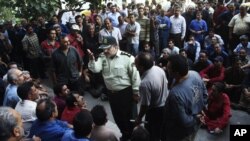Secretary of State Hillary Clinton said recently that civil society – made up of robust, non-governmental civic organizations – “is the underpinning of a free and functioning country.” But, she noted, the repression of civil society by governments is on the rise:
“Civil society is a target because it is, by its very nature, an organized threat to governmental oppression. It gives citizens a way to improve their lives without government direction or permission. It brings people together around a shared mission, and there are few things repressive governments fear more than citizens banding together with a common purpose.”
The Iranian regime has shown itself to be just such a repressive and fearful government. In its most recent report on human rights in Iran, the U.S. State Department noted that Iranian authorities continued to crackdown on virtually every aspect of Iranian civil society, including journalists, women’s rights activists, human rights defenders, members of Iran’s religious minorities, bloggers, poets, film makers, university students and labor leaders – “arresting, torturing, and prosecuting them for their dissent.”
On December 13th, Human Rights Watch published a report asserting that the “space in Iran for civil society has been shrinking following the disputed presidential election of 2009.” As a result, the number of civil society activists who have applied for asylum and resettlement to third countries has markedly increased.
The Human Rights Watch report documents the experience of dozens of civil society activists who have been persecuted by authorities and who have fled Iran and now live in exile.
The continuing government crackdown on Iran’s civil society is an abuse that weakens the fabric of a country, and contravenes the belief that people, in Secretary Clinton’s words, “do not exist to serve their governments; rather, governments exist to serve their people.” In addition, as Secretary Clinton has said, such a crackdown “demonstrates the fear of illegitimate rulers; the cowardice of those who deny their citizens the protections they deserve.”
“In Iran and around the world,” said President Barack Obama, “the United States will stand with those who seek justice and progress and the human rights and dignity of all people.”
“Civil society is a target because it is, by its very nature, an organized threat to governmental oppression. It gives citizens a way to improve their lives without government direction or permission. It brings people together around a shared mission, and there are few things repressive governments fear more than citizens banding together with a common purpose.”
The Iranian regime has shown itself to be just such a repressive and fearful government. In its most recent report on human rights in Iran, the U.S. State Department noted that Iranian authorities continued to crackdown on virtually every aspect of Iranian civil society, including journalists, women’s rights activists, human rights defenders, members of Iran’s religious minorities, bloggers, poets, film makers, university students and labor leaders – “arresting, torturing, and prosecuting them for their dissent.”
On December 13th, Human Rights Watch published a report asserting that the “space in Iran for civil society has been shrinking following the disputed presidential election of 2009.” As a result, the number of civil society activists who have applied for asylum and resettlement to third countries has markedly increased.
The Human Rights Watch report documents the experience of dozens of civil society activists who have been persecuted by authorities and who have fled Iran and now live in exile.
The continuing government crackdown on Iran’s civil society is an abuse that weakens the fabric of a country, and contravenes the belief that people, in Secretary Clinton’s words, “do not exist to serve their governments; rather, governments exist to serve their people.” In addition, as Secretary Clinton has said, such a crackdown “demonstrates the fear of illegitimate rulers; the cowardice of those who deny their citizens the protections they deserve.”
“In Iran and around the world,” said President Barack Obama, “the United States will stand with those who seek justice and progress and the human rights and dignity of all people.”






